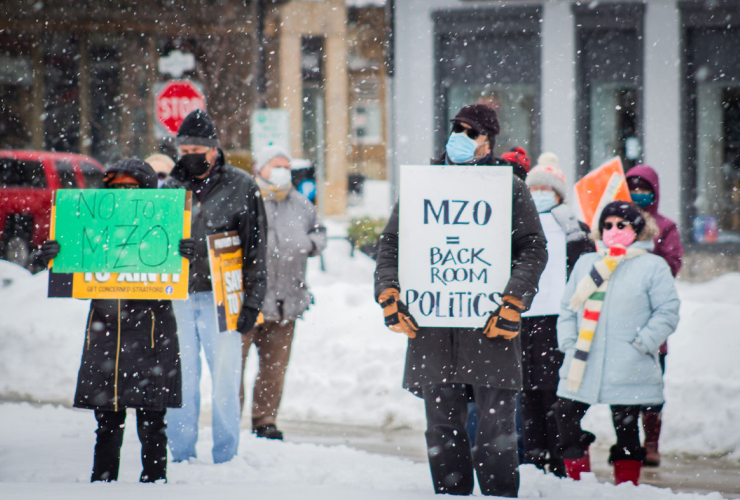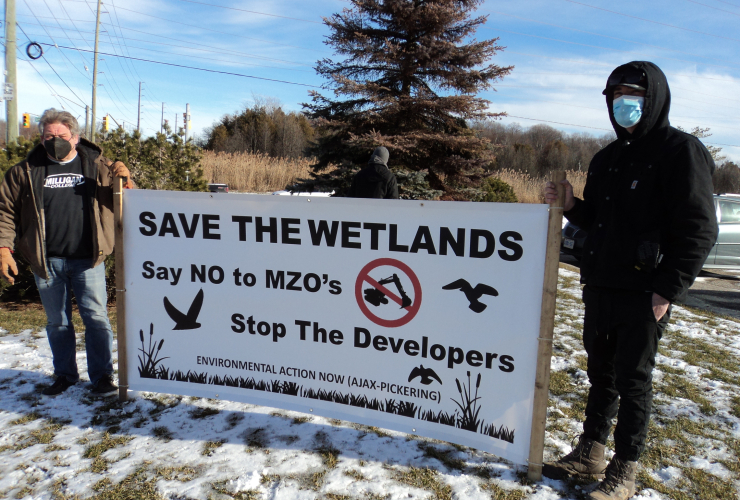The Ford government’s commitment to compensate for land lost to development from a controversial land zoning power won’t make up for the loss of natural spaces, critics said.
On Wednesday morning, Ontario Municipal Affairs Minister Steve Clark promised to protect two acres of land for every acre the province develops using the mechanism, called a minister's zoning order or MZO. The pledge also applies to previously issued MZOs — the province will protect nearly 6,000 acres of land to replace the nearly 3,000 acres developed using the power.
Phil Pothen, the Ontario environment program manager for the non-profit Environmental Defence, said the announcement is an "awful lot less than meets the eye."
"It's really just greenwash for the government's extraordinary misuse of MZOs to drive sprawl onto Ontario's precious remaining farmland and natural areas," he said in a phone interview.
"What's worse is, there's every reason to expect that this will be used to blunt political opposition to development of land, even land of ecological value that's greater that is under threat.”
MZOs give Clark the power to rezone land without the possibility of an appeal, skipping the local planning process. The orders either apply to provincial land, or are granted at the request of local municipalities. Over the past year, the Ford government has taken criticism for using the controversial power to fast-track developments.
Speaking to reporters Wednesday, Clark didn’t directly answer when asked how the province will ensure the protected land has the same ecological value as that lost to development.
He also denied the announcement was made in response to increasing scrutiny over the environmental impact of MZOs, and said he wasn’t sure how many new MZOs the province will use in the year before the next election.
“Our government will have a huge commitment to protect our natural environment,” Clark said.
“I haven't worked out the details because the consultation hasn't finished yet, but I've certainly set a mark for protection moving forward.”
Critics at Queen’s Park were quick to condemn the plan, saying nature can’t be replaced so easily.
Ontario NDP environment critic Sandy Shaw said it amounts to "ecological madness.”
"This is a way for (the government) to hand over valuable and ecologically significant lands to developers," she said in a phone interview.
"This government either doesn't understand how ecological systems work, or they hope that the people of Ontario don't understand."
Ontario Liberal Leader Steven Del Duca also lodged his concern: "Trusting Doug Ford to protect green space is like trusting an arsonist with a pack of matches," he said via Twitter.
Ontario Green Party Deputy Leader Dianne Saxe, a former environmental commissioner, said the announcement was "nonsense."
"The Ford government seems to think that land is interchangeable like Lego blocks," she said in a statement.
"Of course they should expand protected areas; Ontario has only a fraction of the protected areas that the whole world has agreed to. But that will never make up for the damage they cause by destroying irreplaceable public assets in critical locations, like the (Duffins) Creek wetlands.”
Conservation land announced by Clark was already protected from development
At the government's announcement in Georgina, Ont., about an hour’s drive north of Toronto, Clark also said the province would use an MZO to transfer 360 hectares (nearly 890 acres) of privately owned land in the North Gwillimbury Forest to the Lake Simcoe Conservation Authority. The government said the forest lands were “currently slated for development.”
However, most of the area included in the transfer had already been protected. In 2019, a Land Planning Appeals Tribunal (LPAT) ruling rendered 92 per cent of the property off limits for development because large portions of the site were covered by sensitive wetlands.
The land technically falls in the Greenbelt, but the previous development plans predated the creation of the protected area.
Pothen said it's a good demonstration of what environmentalists fear could happen. "Protecting land that nobody is presently seeking to develop, or land that is already off limits for development, has no net impact on the amount of habitat and farmland that will actually remain," he said.
Clark said even though the forest was mostly protected already, the move to transfer the lands to the local conservation authority is an important step.
“This was something that was started by the government long before the LPAT hearing,” he said, adding that the province had been working on the file since 2018.
Earlier this year, a National Observer investigation found that the Ford government had used 14 of 38 zoning orders issued between 2018 and 2020 to override environmental concerns. In nine of those cases, environmentally significant MZOs benefitted developers who donated significant sums to Doug Ford’s Progressive Conservatives. (The Ford government has since handed down additional MZOs — it has now issued 44, with a 45th order made using a similar but slightly different zoning power.)
One of the developers featured in the story — and in a National Observer/Toronto Star investigation into the money, power and influence behind a Ford government highway project, the 413 — is DG Group, the company that was seeking to develop the North Gwillimbury Forest land.
Clark’s office didn’t immediately answer questions about whether DG Group was still in possession of the land and transferring it to the conservation authority, or if the province would purchase it. Spokesperson Krystle Kaputo said the province is still negotiating the "proposed transfer of the lands."
Clark didn’t directly answer when asked whether the government would protect ecologically significant wetlands on land already affected by MZOs.
And he dismissed the idea that the government’s plan to replace land developed by MZOs was a licence to issue more of the orders. He also said the government remains committed to expanding the protected Greenbelt and won’t issue MZOs on Greenbelt land.
The North Gwillimbury Forest Alliance, a local group that fought for eight years against DG Group’s attempt to develop the land, thanked the government Wednesday for protecting the land.
“The new nature reserve will be a priceless ecological asset for the Town of Georgina, the Lake Simcoe watershed and the Province of Ontario,” Jack Gibbons, the chair of the group, said in a press release.
Updates and corrections
| Corrections policyThis story was updated to include reaction from critics.
This story was updated again to include more reaction.
This story was updated to include additional information from Minister Clark's office about the transfer of lands.
This story was retopped with reaction to the announcement.
Having dismantled many
Having dismantled many environmental protocols to facilitate development, the Ontario government is now making it up as it goes along, and Mr Clark continues to have no answers to questions posed for years.






Comments